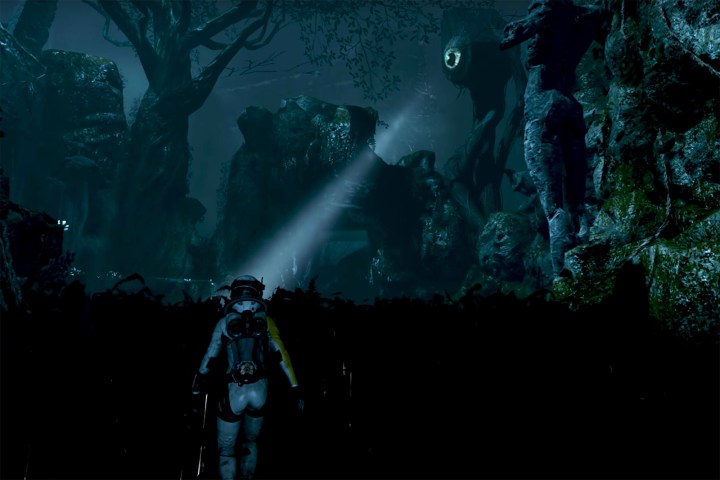Sony is about to drop Returnal, the PlayStation 5’s biggest game since the console’s November launch. It’s not developed by Insomniac, Naughty Dog, or any of the heavy hitters we’ve come to associate with first-party Sony exclusives. Instead, it’s by a lesser-known Finnish studio called Housemarque.
While the studio has carved out an indie niche over the years, this is its first real crossover into AAA gaming. All eyes will be on Returnal, the developer’s most high-profile project yet, when it lands on April 30. Considering the advertising muscle Sony is putting behind it, Returnal could be a make-or-break game for Housemarque. Judging from what we’ve played of it so far, it’s certainly trending toward the former.
If the game is a success, Returnal may be a turning point for the video game industry. It could signal that major studios are ready to put increased faith — and cash — in indie developers to lead the future of gaming.
Indie turned AAA
The first thing players might notice about Returnal is that it doesn’t feel like a regular AAA game. It certainly looks like one thanks to the power of the PS5, but the gameplay is more akin to a game like Risk of Rain 2 or Enter The Gungeon. It’s a “bullet hell” roguelite with some Metroidvania touches. That might sound like a foreign language to those who have yet to dip their toe into the indie game landscape.
What’s genuinely exciting about Returnal is that it doesn’t feel like a regular Sony exclusive. The studio’s biggest games have started settling into a template over the past decade. Marvel’s Spider-Man, Horizon Zero Dawn, and Ghost of Tsushima all follow the same basics on some level. They’re narrative-driven, open-world action games with skills and tools to unlock.

That’s not a description that fits every Sony exclusive (see Ratchet & Clank or Gran Turismo), but many of its most bankable recent releases fit the bill. It’s a bit like how Marvel Studios handles its films. The heroes, directors, and style change from movie to movie, but the formula is worked out to a science. Like Marvel, Sony is able to deliver consistent entertainment that rarely misses the mark.
One major difference between Returnal and those other games is that it’s not by an in-house, Sony-owned studio. Many of PlayStation’s biggest releases come from SIE Worldwide Studios, a division of Sony Interactive that oversees several development teams. Instead, Housemarque is an independent team that has mostly specialized in arcade-style action games over the years. It quietly made a name for itself over the past two decades with deep cuts like Nex Machina and Super Stardust.
Sony has published several of Housemarque’s games in the past, though not one of this scale. This is the kind of high-budget project players expect to see from a big-name studio like Guerilla Games. To draw another cinematic parallel, it’s a bit like George Lucas jumping from American Graffiti to Star Wars.
New Hollywood
The Lucas comparison is fitting, because it highlights exactly where we might be at in gaming’s evolution. Much of the industry’s history is analogous to cinema’s on some level. Classic Atari games feel like early silent film experiments. The “big three” dynamic of the past few decades isn’t too far off from the old studio system that dominated the Golden Age of Hollywood from the 1920s through the 1960s. Even the rise of indie games lines up pretty neatly with cinema’s own independent scene.
If we follow that trajectory, gaming is about to hit its New Hollywood equivalent. That was an era of film where studios began snatching up younger filmmakers outside of the studio system and funding their fresh ideas in an attempt to revive a struggling industry. That resulted in a period of experimentation that produced bold films like Apocalypse Now, The Graduate, and Jaws.
Think of Housemarque as young Francis Ford Coppola with a Hollywood budget.

We’re not just seeing this with Returnal. Earlier this year, the Xbox Series X got its first big exclusive with The Medium. The game was developed by Bloober Team, an indie studio known for cult horror games like Observer and Layers of Fear. Despite not being an in-house Microsoft production, the company positioned it in the same way it would a Halo game.
It’s a fascinating move in retrospect. The Medium isn’t an action-heavy horror game. It’s a minimalist psychological thriller that features no combat whatsoever. That’s certainly not the kind of game we’ve come to expect from the “golden age” of gaming, where maximalist action is king.
If that trend continues, we could see a fundamental shift to the video game landscape over the next few years. Major companies like Sony and Microsoft could take some bold power plays by giving indie studios the budget to bring their wildest ideas to life, carte blanche. There’s a future where the next decade of gaming looks completely different from anything we’ve seen so far and produces some of the industry’s most audacious hits.
Based on our playing time with Returnal so far, the game seems like a success when it comes to that emerging experiment. It’s a clever genre mash-up that has the creative energy of a game like Dead Cells. It doesn’t feel like it was engineered by executives weighing what sells best or what can land above an 80 on Metacritic. The more we can get games like that, the better.



